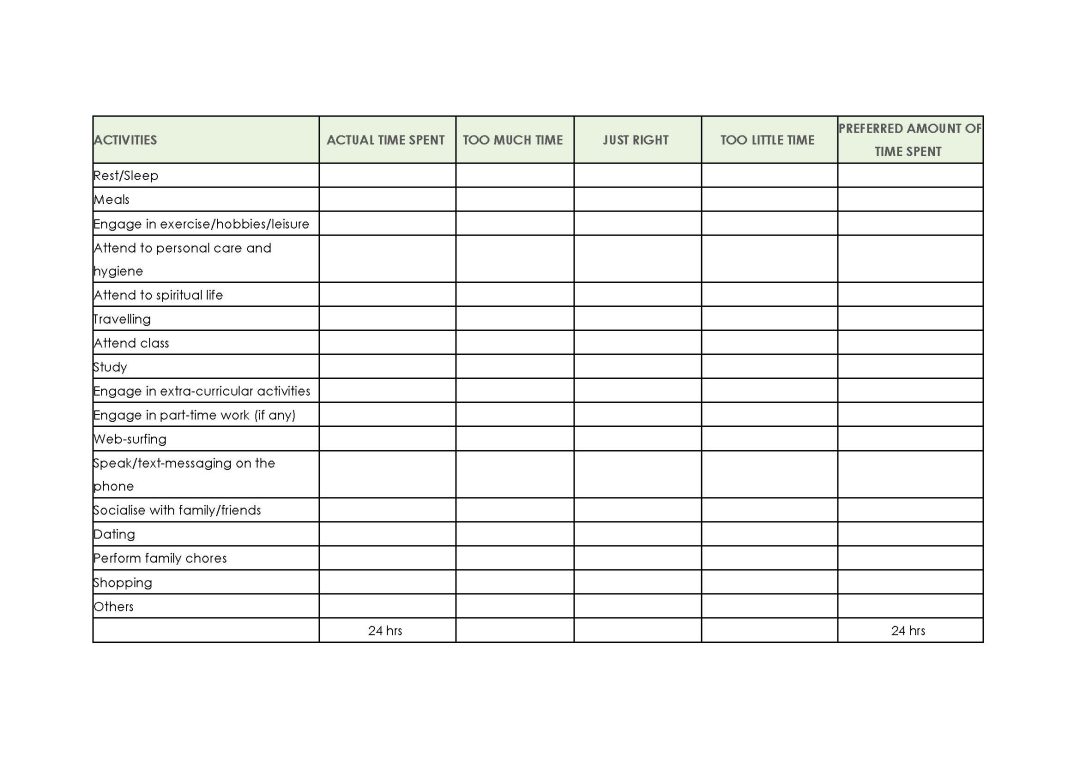After being freed from the structure and rules in secondary school, students may slack off at the beginning of the semester since they often fail to realize that deadlines of projects, assignments and exams are fast approaching. To avoid being overwhelmed by an unmanageable workload or work schedule, you should learn to manage your time effectively from the very start.
You may wish to refer to the following steps and tools to improve your time management skills:
Assess how you normally use your time – complete the following daily log* of what you do and the number of hours that you allocate to it for a week, see whether you need to make adjustments in your schedule to accommodate your goals and priorities:
*Daily Log: Determine and assess the amount of time (in hours.) you normally spent in the following activities each day (Actual time spent), and also write down your preferred amount of time spending in those activities:

Try to compare the items of “Actual time spent” and “Preferred amount of time spent”, see if your “Actual time spent” is “Too much time”, “Just right” or “Too little time” spent comparing to “Preferred amount of time spent”. And then, you can decide how you want to better allocate your time. If you want to enhance your Time Management Skill, please continue to read the following time management tips.
Use Time Management Tools
As a university student, there are many things that you need to attend to. It can become rather difficult for you to keep track of the activities and appointments in your daily life without a special aid. It would therefore be desirable to start the habit of using organizers, such as monthly schedules, calendar or time management apps on smartphone or timetables for your daily affairs and various commitments. You can manage your work and activities better if you have a clearer picture of the allocation of working hours and leisure time in your daily routine.

Assess the Tasks in Hand
As the semester begins, it would be wise to list out all the assignments and deadlines for coursework or papers, dates of examinations and major events. You can also estimate the amount of time that you are going to devote to family, friends, extra-curricular activities and part-time job. Furthermore, you should assess whether you have extra capacity to handle various activities at the same time. If you do not, then set priorities and make adjustments to set aside less urgent tasks.
Set Practical Plans
You can draft a plan for every single piece of coursework or thesis: list the key points, estimate the time necessary for data collection and analysis, estimate the length of each section as well as set the deadlines for initial draft and final reports. If you succeed in dividing a large project into a few smaller tasks, you can gain a better sense of achievement and grasp a clearer picture of your progress. It also helps to avoid delays and chaos. Remember, procrastination will only make things worse! Deal with your work as soon as possible!
Utilize Free Time
If you only have limited free time in between lessons, it is wise to use this time to deal with daily routine or mundane matters, such as banking, replying calls or emails, reading newspaper or magazines, going for meals or taking a nap. However, if you have more free time or even a half day-off, you can consider undertaking tasks that require more thought or better concentration such as doing coursework or reading reference materials. Being an effective time-manager will enable you to derive the greatest joy and benefit from the freedom and opportunities offered by the university.




![[Flourishing First Year @ CUHK] ‘Good Night, Sleep Tight’ Seminar [Flourishing First Year @ CUHK] ‘Good Night, Sleep Tight’ Seminar](https://www.sunshine.cuhk.edu.hk/wp-content/uploads/2023/03/Event-Poster_Sleep-Well-talk_v5-300x300.jpg)

![💼 [Flourishing First Year @ CUHK] “Actualize the Best of Me” Talk: Wong Ming Lok shares how you can achieve your dreams through work📊 💼 [Flourishing First Year @ CUHK] “Actualize the Best of Me” Talk: Wong Ming Lok shares how you can achieve your dreams through work📊](https://www.sunshine.cuhk.edu.hk/wp-content/uploads/2022/10/EventPoster_Wong-ML-talk_finalised-300x300.jpg)